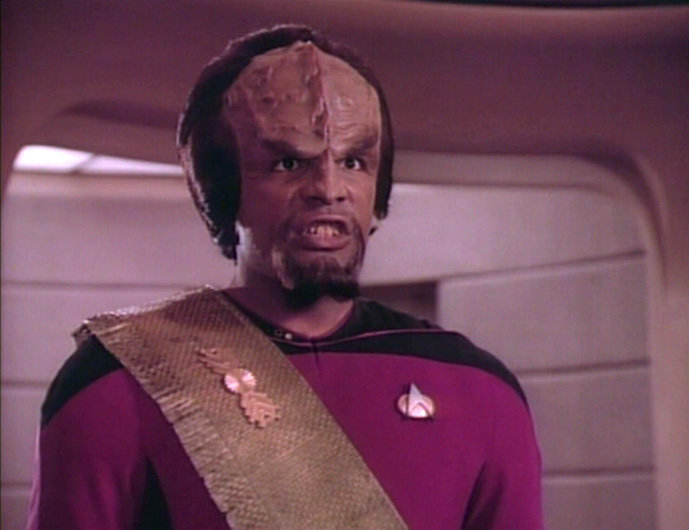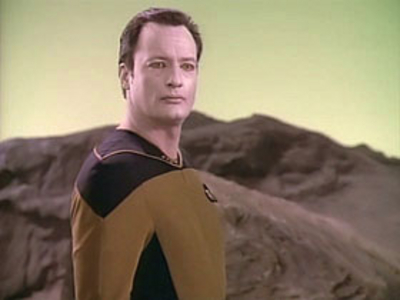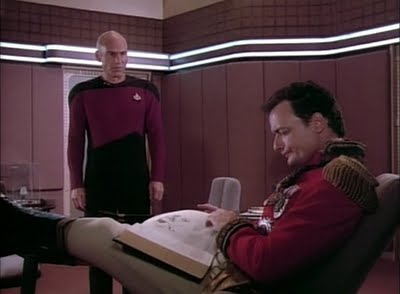“Hide and Q”
Written by C.J. Holland and Gene Roddenberry
Directed by Cliff Bole
Season 1, Episode 9
Production episode 40271-111
Original air date: November 23, 1987
Stardate: 41590.5
Captain’s Log: En route to a medical emergency, the Enterprise encounters Q once again, who insists they abandon their mission of mercy. The Q was intrigued by their encounter at Farpoint, and wants to apparently test humanity further—he does so first while appearing as a three-headed Aldebaran serpent, then later as a Starfleet admiral. He sends Riker, Data, La Forge, Yar, and Worf to a Class-M planet where they are to participate in what Q describes as a “deadly game.” When Yar objects, Q calls it a game penalty and sends her to the penalty box: back to the Enterprise.
Picard, meanwhile, is stuck alone on the bridge, cut off from the rest of the ship with malfunctioning instruments. He’s joined by Yar in her penalty box, and then by Q, who arrives to talk to him. They soon make a wager: if Q succeeds, Picard will give up his command; if he doesn’t, Q will never bother humanity again.

He pits them against aliens dressed as French soldiers from the same era as Q’s outfit, armed with muskets that fire bolts of energy. Q tells Riker that he has the power of the Q and can send them all back to the ship. He does so, and Q and he have a talk. The Q-Continuum has become curious about humanity, and their potential. They wish to learn more, and want Riker to join them. Riker, however, refuses—so Q disappears, and brings back the same group as before, plus Picard, Yar, and Wes, but now without their phasers.
The aliens attack again, and Worf takes down a few before being killed, and Wes is killed a moment later. Riker then transports everyone back to the Enterprise, bringing Wes and Worf back to life.
Picard asks Riker to promise not to use his newfound abilities, as they’re too dangerous for any human to deal with. Riker agrees, giving his word.
So naturally they show up at the rescue (on time, thanks to Q manipulating time), and Riker is tested right away when a young girl is found dead, and Riker cannot bring her back to life because he promised Picard he wouldn’t.
Riker gets angry at his inability to save the girl, and his arrogance becomes palpable—he even starts calling the captain “Jean-Luc.” He tries to explain that he’s the same old Riker, and that the Q has the best of intentions, and the crew believes neither statement. Riker wishes to simply help his friends out, and Q—dressed now as a monk—urges Picard to fulfill the request.
In full “I’m smarter than you” mode, Picard agrees and encourages everyone to accept Riker’s gifts if they so choose.
In short order, Riker ages Wes ten years, gives La Forge working eyes, and provides a sex partner for Worf. Data refuses to let Riker make him human, and the others reject the gifts as well. (La Forge pointedly says, “I don’t like who I’d have to thank.”) Riker realizes that Picard was right—he couldn’t handle it. Picard doesn’t actually say “I told you so,” but you can tell he’s thinking it very loudly.
As soon as Riker renounces his powers, the rest of the Q-Continuum rather violently summons Q home, since he lost Picard’s wager.
The Boy!?: Wes gets aged ten years, fulfilling his wildest dreams, and earlier in the episode he’s stabbed in the back, fulfilling the wildest dreams of the legions of Wesley-haters. Both, however, are reversed.

If I Only Had a Brain : Data refuses to be made human by Riker, because he knows that—even if it was real to Q and to Riker—it would not be real to him.
Q also disguises himself as Data, and deLancie looks very silly in yellow contact lenses….
There is No Honor in Being Pummeled: Worf puts on a decent show, leaping over the railing to point a phaser at Q, growling at him, refusing to drink with him, and scouting the enemy combatants. He takes down two of those combatants unarmed before they kill him.
He also gets the nickname “Micro-Brain” from Q, a nickname that would stick. Oh, and he refuses sex for no obvious reason. (See below.)
No Sex, Please, We’re Starfleet: La Forge apparently has the hots for Yar, a fact never mentioned before and never mentioned again.
Meanwhile, Worf claims to have no place in his life for sex now—a position he would reverse in “The Emissary.” And when he started dating Troi. And when he married Jadzia Dax. And when he slept with Ezri Dax. And .
Welcome Aboard: John deLancie returns as Q, and is as magnificently snotty as ever. He leaves even more teeth marks on the scenery in his sophomore outing, all to good effect.
I Believe I Said That. “A marshal of France? Ridiculous!”
“Well, one takes the jobs one can get.”
Picard, critiquing Q’s choice in wardrobe, and Q shooting back.
Trivial Matters: This would be the last time we’d see the “Q force field.” Q was firmly established as a recurring character in this episode, and he would go on to appear in almost every season, as well as several times on the spinoffs Deep Space Nine and Voyager.
Q has appeared regularly in the novels and comic books as well. For purely egotistical reasons, I wish to mention one in particular, the 2007 novel Q & A by, well, me—it provides the true reason why Q was so interested in humanity’s potential in this episode.
The episode’s co-writer with Roddenberry was actually Maurice Hurley, one of the show’s producers, who would go on to become the show-runner in the second season. He had a ton of writing credits on the show, and it’s unclear why he used a pseudonym for this one. (He would also write the second-season Q episode, “Q Who.”)
Make It So: An episode that is a joy to watch, mostly, but is clumsily written and has a lot of head-scratchers and predictable outcomes. The entire arc with Riker is so paint-by-numbers the color is practically dripping off the screen.
The penalty box was introduced to no good end except to pointlessly remove Yar from the field of battle—Q’s threat of putting someone else in the penalty box and killing Yar is never fulfilled. And then when Q reverses the penalty, Yar is still stuck on the bridge.
It actually reeks of a certain sexism that Yar is taken out of the action before the action starts, and when Riker gives gifts to the bridge crew, Crusher and Yar are completely left out. (Troi isn’t even in the episode.)
The episode also makes what is obviously now a tactical error in putting Q alongside Riker. Jonathan Frakes and John deLancie don’t have a tenth of the chemistry that deLancie has with Sir Patrick Stewart. This is made painfully obvious here: the Picard-Q scene in the ready room where they trade Shakespeare quotes simply sparkles (with the added entertainment value of Royal Shakespeare Company veteran Stewart declaring, “I know Hamlet!”), where the banter-trading with Riker is leaden. Future episodes with Q paired deLancie and Stewart much more regularly.
And indeed, what saves the episode are deLancie and Stewart. The former in particular is so obviously having fun with the role that the episode itself is also fun despite its flaws.
Warp factor rating: 5.
Keith R.A. DeCandido has written a whole lot of Star Trek fiction, but probably the most fun he had was writing Q & A, the 2007 novel that was, in many ways, the ultimate Q story. So go read it, will ya? You can follow Keith online at his blog or on Facebook or Twitter under the username KRADeC. Go there and tell him how awesome you thought Q & A was.











A better quote is this exchange between Riker and Picard:
Riker: I feel like such an idiot.
Picard: Quite right. So you should.
Kirk would never have been so blunt (and accurate)…
You’re right: de Lancie and Stewart save the episode. I liked this one a lot when it was new — and I was a sophomore in high school — but it hasn’t aged well. (Nor have I, I suppose, but we’ll save that for another time.) Even at the time, when I was showing it to my mother — in that brief window of time after Star Trek IV when I thought I might make a fellow Trek fan out of her — her only comment was, “It’s awfully talky, isn’t it?”
I still adore the ready room scene, though. It’s not only a great performance from two true thespians but also a crystal-clear summary of the heart of “Star Trek”‘s philosophy:
Q: Surely you don’t see your species that way.
Picard: I see us one day becoming that!
“They soon make a wager: if Q succeeds, Picard will give up his command; if he doesn’t, Q will never bother humanity again.”
–We know how well Q held up his end of the bargain on that one! No wonder when, in “Devil’s Due,” it is considered whether Ardra is Q, Picard correctly asserts, “Q wouldn’t bother with contracts!”
“This would be the last time we’d see the “Q force field.”
–I wonder if it was inviting too many comparisons to the Tholian Web.
I do have to say: comparisons with Trelaine aside (could HE be a Q?), Q is one of my favorite antagonists from the 80s/90s. In a way, he reminds me of the Genie from “Aladdin,” though obviously more menacing. I always enjoyed Q’s exchanges with Picard (yes, including in “Q and A;” “I just wanted to see you in tights!”) and later with Vash, and one gets the impression that his snotty comments must have been a lot of fun to write! (Even I got a chance to write for him a little bit, when I used him in a “Trek” RPG I was hosting.)
DRickard: That was my second choice for quote, actually. *chuckle*
Mike: That scene makes the episode, honestly.
don3comp: Well, Peter David presented Trelane as a Q in the novel Q-Squared.
—Keith R.A. DeCandido
Worf does much more than “putting a decent show”; he’s got courage to spare: “And now a personal request, sir. Permission to clean up the bridge.” Suicidal, but brave.
Lektu: That line wasn’t from this episode, that was from the pilot, “Encounter at Farpoint.” In this episode he jumps over the railing to point a weapon (that’s useless), then sticks with symbolic gestures: growling on the bridge (something the character would do a lot in Q’s presence), and pointedly pouring out the drink Q provides and tossing away the glass (which was beautifully played by Michael Dorn). And then he gets himself killed. He doesn’t really accomplish anything in the episode — of course, aside from Picard, neither does anyone else…..
krad: Ah, sorry I mixed the eps. It’s been a long time. And thanks for the correction.
“Clumsily written” is an understatement. Most of the first season is clumsily written, but the dialogue in this one is barely competent. No wonder Hurley used a pseudonym. I mean, seriously, Q is a superintelligent, gigayears-old, nigh-omnipotent entity, and the best insult he can come up with is “Macro-head for a micro-brain?” A ten-year-old could concoct better material. Dialogue was never one of Roddenberry’s great strengths, but he was in particularly poor form here (unless this is one of the ones where his lawyer did the rewrites).
The episode also suffers from budget problems, with another cheap-looking soundstage planet and a ridiculous video effect for the Aldebaran serpent.
It does have some points of interest, though, as noted. The Shakespeare scene is cool — although a little awkward conceptually, since by his own admission Picard is using the quote in a different sense than Hamlet used it. And there’s the seed of a valid idea in Riker’s temptation to exploit the Q power, but it’s weakly and anticlimactically handled.
The cool thing though (coming from a theatre background) is that most of Shakespeare can be twisted and molded to one’s own end. You can make heroes into nearly villains and bad guys so affable that you feel sort for them. This mere fact is why we’re so inundated with the myriad of representational settings and modernizations for his plays. Sure there are soliloquies that, when in context, need to be presented in a way for the play to make sense. But as a one off monologue? They’re perfect for the purpose Picard uses here. Oh yes, he knows “Hamlet”: knows it so well he can drop that knowledge on Q AND use to meet his own ends in winning the argument.
Worf “not having a place for sex in his life” seems to change after he meets his son. Apparently, part of the Klingon Code of Honor has a HUGE problem with pre-marital sex. Worf does relax on that point in later seasons and in DS9 (as I’m sure anyone would when encountering either on-screen incarnation of Dax). Besides, everyone has had that one former significant other that has totally warped our ideas about relationships and sex.